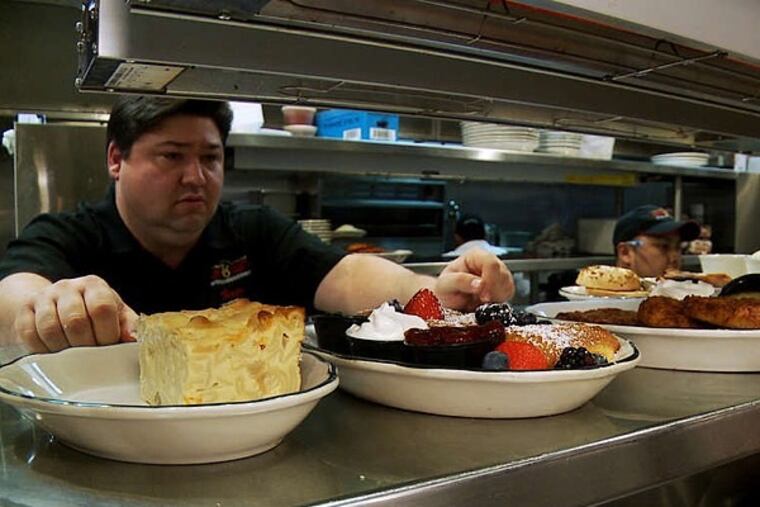Driven by their love for lox, filmmaker and restaurateurs uphold vanishing deli tradition
The Jewish delicatessen - whitefish for days, chopped liver for weeks, pastrami stacked on rye so high it defies all natural jaw function - is one of the most identifiable eating institutions in America. But casual corned-beef fans might not realize that it's also an endangered species.

THE JEWISH delicatessen - whitefish for days, chopped liver for weeks, pastrami stacked on rye so high it defies all natural jaw function - is one of the most identifiable eating institutions in America. But casual corned-beef fans might not realize that it's also an endangered species.
Once a prolific force in any big city or small town with a Jewish population, the deli - and its role as a culinary and cultural center - has been dwindling for decades. David Sax's 2009 book, Save the Deli, took the temperature of the scene and returned with some staggering numbers. In 1931, there were some 1,550 kosher delicatessens operating across the five boroughs of New York City alone; today, there are fewer than two dozen. And that trend has played out across North America, for a variety of reasons: the skyrocketing cost of doing business, a deterioration in quality and an aging core clientele among them.
Inspired by books like Sax's, as well as his food fixations and Jewish roots, Abington-born-and-raised filmmaker Erik Greenberg Anjou presents a personal take on the past, present and future of the delicatessen with his new documentary, "Deli Man."
Anjou, who was a bar mitzvah at Beth Sholom Congregation, in Elkins Park, and graduated from William Penn Charter School, has some strong opinions about where the deli is going, and why.
And he's not the only one.
The torchbearers
Anjou has produced docs on Jewish liturgical music and the Grammy-winning klezmer band the Klezmatics. He started work on "Deli Man" after meeting his film's breakout star: Ziggy Gruber, a third-generation restaurateur who owns Kenny & Ziggy's, a popular New York-style establishment in Houston, Texas.
A loquacious, outsize personality as quick with a Yiddish phrase as he is with a joke, the 40-something Gruber is a young guy by his profession's standards, which got Anjou thinking about those carrying the torch for delis in this tough climate.
"In my own search to make sense of my Jewish roots, I saw Ziggy attacking the same substrate with a very strong, passionate point of view," said Anjou. "It really hit home for me. Here is something imperiled. What's being done? Is it going to fall by the wayside?"
"Deli Man," which Anjou started filming in 2011, addresses these questions by starting with the framework built by Jewish European immigrants in the early 1900s, then moves forward.
Notables like Larry King and Jerry Stiller provide commentary as the production bounces around the continent, profiling old- and new-school delis in such cities as New York, Los Angeles, San Francisco, Chicago and Toronto.
Philly deli
The film doesn't touch down in Anjou's hometown, but that doesn't mean we don't have a passionate pastrami culture. The most famous name in Philly delis, of course, is Famous - the Famous 4th Street Delicatessen in Queen Village. Open since 1923, it's been in the hands of Russ Cowan, a fourth-generation operator originally from Brooklyn, for the last decade.
Like a proper deli man, Cowan has his eyes on everything: He pickles his own corned beef, smokes his own pastrami, does his own baking and has no intention of ever easing up on this process.
"I will not compromise my product," said Cowan of what powers the consistent performance of the Famous. "Right now, for example, beef prices are the highest they've ever been. But I feel that, ultimately, people will pay."
If menu prices rise, customers might be temporarily miffed. But if you cut corners to avoid raising them, "you may just lose them for good," he said.
Cowan, who has been involved in the purchase and sale of dozens of businesses over his career, recently gave a shot to a newcomer - a rarity in 2015. This past December, he sold his Famous outpost off the corner of 19th and Chestnut to Rich Kaufman, a fellow Brooklynite looking to make a go of it in the Philly deli business.
"It's becoming a forgotten food," said Kaufman - who's rebranded the Center City shop as Kaufman's Delicatessen - of his motivation to enter the game at such a sensitive juncture.
For love of lox
A former auto dealer and mortgage broker, Kaufman and his Irish-American partner Ken Keating ("we both like corned beef") are familiar with the industrywide challenges outlined in "Deli Man." They're confident that there is still a public hunger for zaftig sandwiches, homemade hamantaschen and loaded lox platters - it's just a matter of marketing the experience to a wider, and oftentimes younger, audience. They're achieving this by emphasizing breakfast and brunch, expanding delivery and catering, and engaging with customers on social media.
"I don't even look at it as work," said Kaufman, of his profession. "I look at it more as my home, and where I live now is a place to sleep."
One of the more poignant scenes in "Deli Man" comes when Gruber walks the streets of lower Manhattan with his elderly father, noting, with an existential edge, the many former Jewish schools and synagogues that long ago ceded their space to retail and restaurants.
Some might say it's an inevitable development. Time is inexorable, after all, and often ends up enveloping our most beloved customs and institutions. But Anjou, for one, doesn't see that as a reason to throw his hands up when it comes to the cooking that's such a striking extension of his identity.
"If you don't have a personal stake in your own cultural tradition," he said, "it'll die."